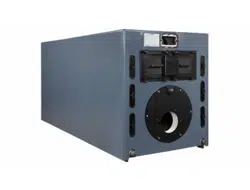Loading ...
Loading ...
Loading ...

Boiler manual: • Installation • Start-Up • Maintenance • Parts
39Part No. 550-110-275/1018
Cleaning boiler heating surfaces and
flueways
Do not brush or vacuum the firebox or combus-
tion chamber area of those boilers using fibrous
combustion chamber material.
Do not use stick-type thermal bombs in this boiler.
1. Soot is an effective insulator and prevents flue gases from
heating the boiler water as efficiently as possible. The fre-
quency of cleaning will depend upon the fuel used, the
burner adjustments, boiler temperature, draft conditions,
and other job factors.
2. Remove top or side jacket panel(s).
3. Remove the flueway opening cover(s).
4. Cover the burner and controls.
5. Using a wire flue brush, thoroughly brush the flueways at
all angles.
6. Remove any soot or scale from the horizontal and/or vertical
flueways, the boiler firebox.
7. Remove access panel and enter the boiler to clean combustion
chamber with special flue brushes provided.
8. Clean the base of the chimney using a vacuum cleaner or
brush.
9. Replace the flueway opening cover(s), access panels and
jacket panel(s), making sure the original gas-tight seal is
maintained.
10. If additional cleaning is required:
a. Replace access panels and start the boiler following all
instructions in this manual.
b. Heat the boiler water to 180°F. Then turn the boiler off,
disconnect electrical power and fuel supplies.
c. Remove the flueway opening covers.
d. Use a garden sprayer or connect a spray nozzle to a
garden hose and spray the sooted flueways with a fine
mist of water.
e. The soot will become loosened and fall to the floor of the
firebox and around the horizontal flueways.
f. Remove the loosened soot.
Seasonal boiler shutdown
DO NOT DRAIN BOILER during periods of shut-
down unless exposed to freezing temperatures.
If boiler is shut down during severe winter weather,
have the heating system inspected periodically or
thoroughly drain the heating and plumbing system
following the instructions in this manual for long-
term shutdown.
1. Turn off all power supplies to the boiler and its components.
2. Close all fuel valves.
3. Cover the burner to protect it from dust and dampness.
4. Steam boilers — open boiler blowdown valve and flush till
clear while under steam pressure.
5. Water boilers — open the boiler drain cock to remove im-
purities. It may be necessary to drain several gallons of water
until all traces of sediment are gone. Refill the boiler to the
proper water level or pressure.
Boiler water does not have to be crystal clear for
proper operation, but should be free of sludge or
sediment.
Long-term boiler shutdown
1. When the boiler and system must be drained for long-term
shutdown, perform the following procedures.
2. Turn off all power supplies to the boiler and its components.
3. Close all fuel valves.
4. Cover the burner to protect it from dust and dampness.
5. Clean all carbon, rust, and other deposits from the fire-side
of the boiler heating surfaces in order to protect the boiler
from the corrosive action of combustion deposits. Follow
the procedure in this manual under " Cleaning boiler heat-
ing surfaces."
6. Apply a thin coating of oil or grease to heating surfaces if
the boiler is to remain out of service for an extended time.
7. Drain the boiler and system as necessary.
To inspect water side of boiler
1. If the water side of the boiler must be cleaned or inspected,
open the blowdown valve and drain the boiler.
2. Hose the inside of the boiler with high pressure water to
remove sludge and sediment. Then flush.
3. Dry the boiler water side thoroughly, or refill with fresh water
and heat to release dissolved gases, following the procedures
in this manual for filling the system.
Repeated draining and filling of the boiler and/
or the heating system can lead to the same conse-
quences as adding too much makeup water. This
is worst where the makeup water is hard.
Cleaning float-type low water cut-offs
1. Accumulated sediment in the low water cut-off should be
flushed out through a blow-off valve provided for this pur-
pose at least once each month of heating system operation.
Cleaning the gauge glass
1. Close the lower gauge glass cock and carefully open the pet-
cock below the glass to blow water and sediment out of the
gauge glass by steam pressure.
2. Then slowly open the lower gauge glass cock, allowing a small
amount of water to flush out through the open petcock.
3. Close the petcock and fully open the lower gauge cock.
4. The water level should immediately rise to its proper level.
Maintenance and troubleshooting
(continued)
Loading ...
Loading ...
Loading ...
